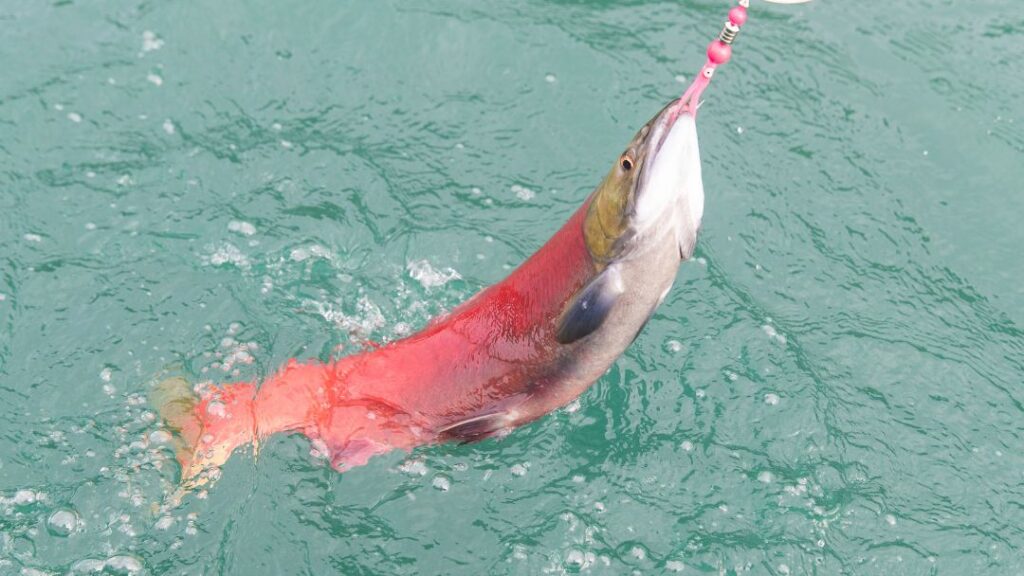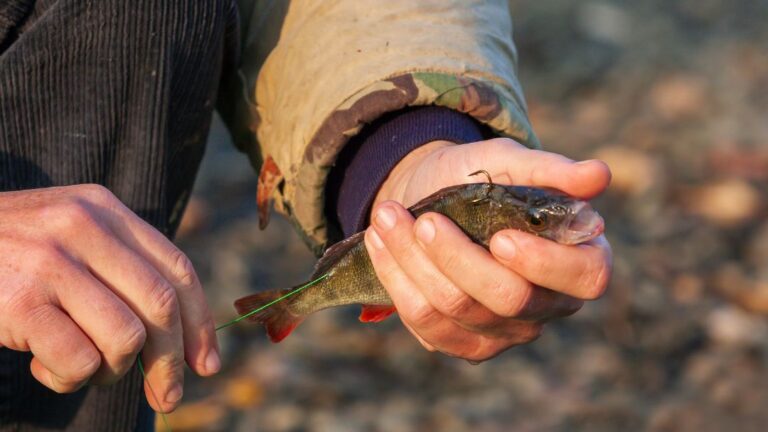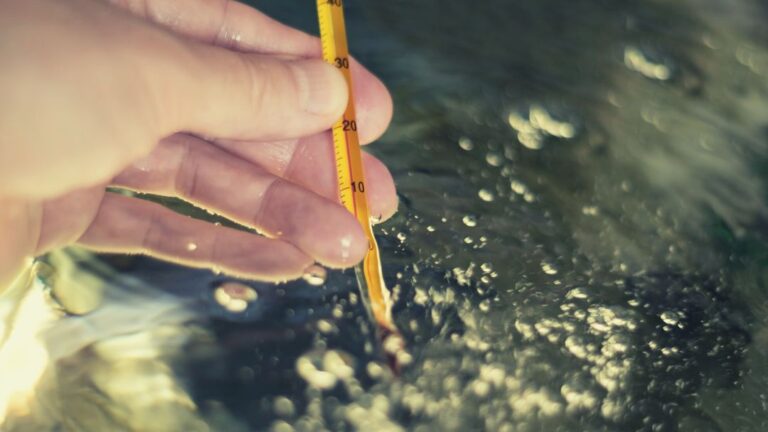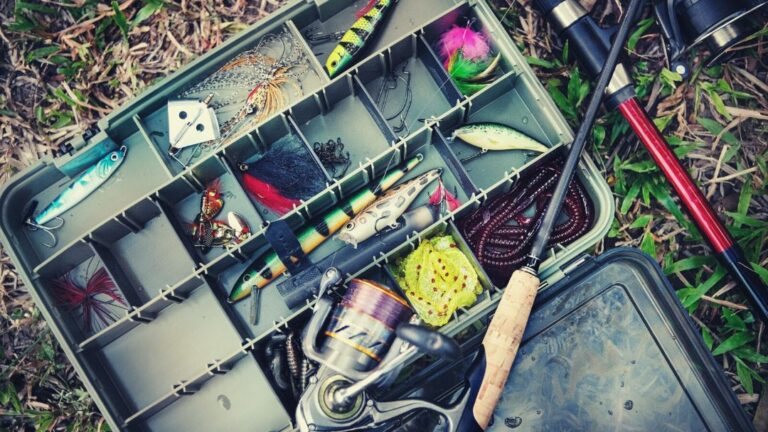The coasts of the North Atlantic and Pacific Oceans are the two primary locations where salmon pass their ocean phase. Salmon fishing is not as easy as some other fishes if you are fishing from rivers, streams, or coastal areas.
Is salmon fishing dangerous? Salmon fishing is a bit difficult as they have thick skin and strong jaw muscles. You may have to go for a tough fight if it is a giant-sized fish. Salmon fishing can be a bit challenging in large oceans or rivers due to the risk of vessel disaster, falling overboard, and slipping & falling.
Is It Hard To Catch Salmon Fish?
Salmon fishes have thick skin and strong jaw muscles.
This makes it difficult for fishermen to penetrate the barbs or points of the hooks through their jawlines. Securing a decent hold appear a bit challenging.
Anglers will struggle to sense the slight movements of salmon due to their reduced sensitivity to external stimuli. You will face difficulty in luring them with baits.
Are you targeting giant salmon fish? They have strong muscles and excellent biting power.
These powerful fish will use their rugged jaw to resist being reeled in. It won’t be easy to lift them into your fishing boat.
Keeping a big eye on large-sized salmon? Be ready to fight vigorously! They can partially or significantly damage your fishing lines, reels, and rods.

Is Salmon Fishing Dangerous?
Most commercial fishermen prefer to catch salmon from the middle of the oceans to target wild salmon populations. This increases the chances of a plentiful catch.
However, salmon fishing in oceans like Alaska can be hazardous. The followings are the common issues you are going to face.
Vessel Disaster
One of the most common issues is vessel disasters. The boat or ship used for catching salmon may sink or capsize in the sea, lake, or river.
Adverse weather conditions, fishermen errors, lack of proper maintenance, inadequate safety measures, etc., are the common causes of vessel disasters.
It can lead to severe accidents, loss of life, and damage to fishing vessels.
Falling Overboard
Some fishermen may fall accidentally from a fishing vessel into the water while engaged in fishing activities. It is known as falling overboard.
Excessive waves, sharp turns, too much weight carrying, uneven weight distribution, adverse weather conditions, working near the edge of the vessel, etc., are common causes of falling overboard.
It is mandatory for fishermen to wear proper fishing gear or equipment while catching fish.
They should also take an instant action to rescue the person who falls and take all precautions to ensure no further harm or loss of life.
Slips And Falls
Slipping and falling are more common for fishermen. Seawater, rain, and fish slime make the surface of the fishing vessel wet and slippery.
Salmon fishing involves withstanding the heavy waves of the ocean. It creates unstable conditions.
Besides, nets, traps, and other fishing gear are heavy equipment. They require careful handling. Otherwise, it will compromise the balance.
How long can you continuously hold the fishing gear? Your body needs rest, right? It often causes fatigue, which can impact concentration and coordination.
Fishermen are losing their alertness and may slip and fall by any chance. Besides, wearing poor-quality shoes, especially on skid flooring, can also cause this issue.
What Are The Health Risks Associated With Salmon Fishing?
Have you experienced any health problems while fishing salmon for several days?
The followings are the common health risks regular fishermen are likely to face unless they take protective measures.
Hearing Loss
Fish populations are higher in the middle of the sea, where you need to go with a boat.
The boat engine creates excessive sound, which can lead to hearing problems.
According to the School Of Public Health, 80% of fishermen from Alaska Sea Grant are facing Noise-induced hearing loss (NIHL) problems.
It is five times higher than regular citizens of the USA. They are fishing from very close to the boat’s engine.
A significant percentage of fishermen have tinnitus and noise-induced hearing loss (NIHL) (4, 6, 8–11). (4, 6, 8–11).
This mainly occurs due to being continuously exposed to excessive noise during the four months of the salmon fishing season.
Sleep Apnea
Catching large-sized salmon fish is challenging. Hence, fishermen have to spend a long time in fishing.
They often work for more than 12 hours straight, especially at night, and don’t get enough quality sleep.
This disrupts their body’s natural sleep-wake cycle and results in sleep disorders such as sleep apnea.
Plus, exposure to loud noise, vibrations, and diesel engine exhaust affects the sleep quality of fishermen.
Many change their lifestyle during the fishing season, such as poor diet, lack of exercise, smoking, or excessive alcohol consumption. All these attributes can contribute to sleep disorders.
Excessive Weight Gain
Fishermen continuously stay in a particular position for hours with minimal movements.
They spend hours sitting and remain relatively inactive while waiting for a catch. It often causes obesity or excess weight.
Another reason for excessive weight gain is irregular eating patterns with poor food choices. They may eat high-calorie foods that cause overweight issues.
Their physical performance will reduce, and they will be more vulnerable to various chronic health problems, such as heart disease, cancer, diabetes, etc.
Upper Extremity Injury
It is not a piece of cake to fight against giant-sized salmon. Reeling them in on the top of the boat requires a lot of work.
They are more vulnerable to various upper extremity injuries. According to the National Institute of Health, 64.8% of fishermen face should pain due to the heavy load of fish.
They have issues in their hand, elbow, and wrist due to repetitive elbow and wrist swinging movements.
Many fishermen feel numbness, weakness, and pain in their hands and wrists due to a continuous heavy workload for hours.
When you often overuse your bicep in an over-the-head motion (casting), it can result in Bicep tendonitis.
What Are The Safety Precautions For Salmon Fishing?
You can’t completely eliminate the risks that are associated with salmon fishing.
But the following safety precautions can reduce the probability of accidents significantly.
01. Stay Informed About Weather Forecasts
Regardless of how good the weather looks, it can change anytime. It is necessary to stay informed about weather forecasts.
Be aware of high waves, heavy rain, turbulent currents, storms, strong wind, and other adverse weather conditions.
Create proper plans A as well as B regarding how to deal with the situation to stay in a safe zone and reduce the likelihood of an accident.
02. Proper Handling Of Fishing Equipment
Do you know how to handle fishing equipment, especially in challenging conditions?
Unless you are an expert, it is not easygoing to carefully use sharp hooks, heavy fishing lines, and other fishing gear. The difficulty level could be higher when your boat or ship is unstable.
Improper handling doesn’t only cause a loss of fish. It can also result in various accidents, such as cuts, punctures, or entanglements.
Fishermen who handle heavy fishing equipment must learn the techniques to use them in extreme weather conditions.
Most importantly, all the fishing gear must be cross-checked to ensure they are functioning correctly without any failure.
03. Wildlife Encounters and Precaution
Have you seen any seals, sea lions, bears, or birds while fishing in oceans or rivers? Make sure you don’t provoke or disturb this wildlife.
Otherwise, you may land in unpredictable or potentially dangerous situations. They may become too aggressive if felt disturbed and attack you.
Maintain a safe distance from this wildlife and avoid approaching or feeding them anything. Be aware of their behaviors and habitat too.
You can keep bear deterrents to deter away dangerous bears and prevent a bear confrontation if they come close to you.
Make sure to know how to use them properly. Otherwise, the bear may not stop coming towards you.
04. Proper Training and Experience
Are you new to salmon fishing? Ensure your team has at least two experienced fishermen to guide how to fish correctly and ensure optimal safety.
Getting the mandatory basic training is necessary to navigate the challenges and risks associated with salmon fishing.
All fishermen on the boat or ship must know how to deal with the situation when any emergency arises.
You must have a fair idea about water safety, equipment handling, and emergency procedures. This will help to reduce the chance of accidents and stay safe.
05. Personal Safety and Self-Care
Do you have a habit of going to fishing even if you are sick? Never do this!
Fishing involves physically involved activities. Unless you are fully fit, you should not go fishing.
Plus, make sure to wear all essential protective equipment, such as life jackets, waterproof clothing, gloves, footwear, etc.
Also, you should keep throwable flotation device(s) in your boat or ship to rescue any people who fall into the water.
Besides, it is a good rule of thumb to keep two small fire extinguishers. If your outboard motor or fuel tank catches fire, you can use it to extinguish or control small fires.
Another important thing is to keep in First aid kits, such as bandages, sterile pads, burn cream, cotton swabs, eye wash, pain relievers, disinfecting liquids, etc., to treat minor injuries.
Final Thoughts
Regardless of the type of fish you want to catch, it is necessary to learn the techniques on how to keep yourself while fishing.
Besides, you want to keep all the essential equipment that is necessary for fishing and keep yourself safe.
Make sure to go for several training sessions on professional commercial fishing if you want to catch fishing in the middle of the ocean or river. After all, it is precarious. Hopefully, you got a clear idea regarding the query, “Is salmon fishing dangerous?” Let me know if you still have any curiosity about this topic.






